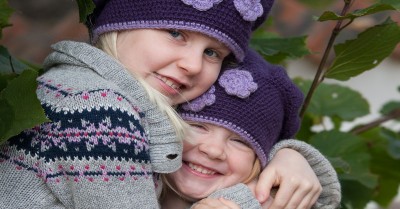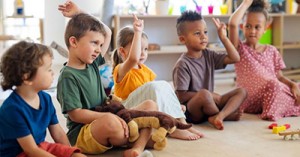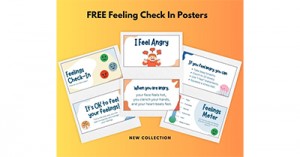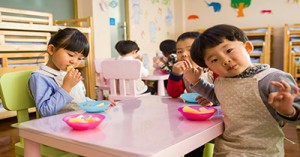As Educators all over the world find out every day, there are certain life skills which fundamentally determine how well children will learn within their learning environment. One of the most important life skills children learn to develop is kindness.
Why Kindness
There has been consistent evidence from scientific studies showing that kindness is the surest way to attain a subjective feeling of well-being, which is really how researchers define happiness. While acts like eating favourite foods, buying what children may want and playing with friends can impart an immediate sense of gratification, it is actually an act of kindness without any expectation in return, that has been found to lend a sustained sense of happiness.
Happy children means happy learning! Furthermore, kindness paves the way for smoother peer and group activities while lessening negative and disruptive behaviours.
Here are a few ways you can encourage kindness in young children and make it an essential part of everyday learning.
Be a Role Model
Children are observing all the interactions around them which means they are bound to pick up behaviour modelled by those closest to them. Make a conscious effort to display kindness in words and actions .For example -
In words:
- you make me laugh,
- you have great ideas,
- go for it,
- I am proud of you,
- I like you,
- you’re important to me
Actions include:
- hug,
- high five,
- a smile,
- thumbs up etc.
Sometimes gestures like rolling eyes or a pointing a finger can unconsciously slip out when you’re busy and in a hurry, learn and practise a few relaxation techniques or time management tips in case you feel things are getting to you. For example -
- pausing and counting to three,
- take five deep breathes
- take a sip of water.
Above all, bear in mind that your little learners look up to you to understand how to negotiate the world around them which is why your words and actions are bound to have a decisive impact.
Teach The Specifics
One of the most effective ways to nurture kindness is to teach children exactly what to say and do. It is hardly helpful just to remind them to “Be kind to others”.
Teach specific words and phrases for example: Thank you, Sorry, Excuse me, Please and when to use them. Once children have gotten comfortable with the basics, show how kind phrases like “how can I help?” or “can we start again?” can be used in situations when tempers or emotions are running high.
Make It Part Of Everyday Learning
Include and encourage kindness every day in the learning environment.
For example: greeting each other in the morning, welcoming a new child, playing with a child sitting alone, hugging a child who may be crying or looks upset.
Since visual cues are hugely helpful in reinforcing messages, put up posters, banners or cut-outs within the environment that celebrate kindness to people, animals and nature.
Children especially learn well with positive reinforcement so have a “shout-out box” in which children can put in compliments or draw a picture to their friends which is given out at the end of the day. Also include plenty of stories and songs on kindness during group time. Another idea is to have a kindness motto for the room or a catchy tagline.
For more information Here is a list of acts of kindness that children can complete.: Random Acts Of Kindness For Children
The Kindness Curriculum has a range of activities that support young children to explore 12 attributes of kindness building agency, initiate their own learning and develop their self-identity. For more information: The Kindness Curriculum|
Garden Of Kindness - The Garden Of Kindness is a free template for Educators to detail the kindness acts for each child. Four kindness acts can be added to each flower that highlight how the child shows their kindness. Kindness acts can be simple as giving a hug in the morning. packing up without asking, saying hello to all Educators etc.
Reference
How to Raise Happy Kids: 10 Steps Backed by Science, Eric Baker, TIME, March 24, 2014







 As an Educator in Australia, your pay rate falls under the Children’s Services Award 2010. This award states the minimum amount that an employer can
As an Educator in Australia, your pay rate falls under the Children’s Services Award 2010. This award states the minimum amount that an employer can When working as a qualified Early Childhood Teacher (with a university degree) within a service, your rate of pay will come from the Educational Services
When working as a qualified Early Childhood Teacher (with a university degree) within a service, your rate of pay will come from the Educational Services When working as a Diploma Qualified Educator your pay rate is from the Children's Services Award 2010. This Award states your minimum rate of pay
When working as a Diploma Qualified Educator your pay rate is from the Children's Services Award 2010. This Award states your minimum rate of pay When working as a Cert 3 Qualified Educator, your pay rate is from the Children's Services Award 2010. This Award states your minimum rate of
When working as a Cert 3 Qualified Educator, your pay rate is from the Children's Services Award 2010. This Award states your minimum rate of Educational Leaders play a crucial role in their early childhood service by ensuring that the educational program aligns with best practices and supports the holistic
Educational Leaders play a crucial role in their early childhood service by ensuring that the educational program aligns with best practices and supports the holistic In early childhood education and care, ratios are more than a technicality—they are a frontline safeguard. Every child deserves responsive supervision, emotional connection, and developmental
In early childhood education and care, ratios are more than a technicality—they are a frontline safeguard. Every child deserves responsive supervision, emotional connection, and developmental With the new national child safety reforms kicking in on 1 September 2025, early childhood services like yours have a real opportunity to lead the
With the new national child safety reforms kicking in on 1 September 2025, early childhood services like yours have a real opportunity to lead the Here’s a comprehensive Mobile Phone and Smart Watch Policy tailored for early childhood education and care (ECEC) services in Australia, aligned with the latest 2025
Here’s a comprehensive Mobile Phone and Smart Watch Policy tailored for early childhood education and care (ECEC) services in Australia, aligned with the latest 2025 The Sea of Fish Challenge is a national initiative that invites children, educators, families, and communities to create and display fish artworks as a symbol
The Sea of Fish Challenge is a national initiative that invites children, educators, families, and communities to create and display fish artworks as a symbol Across the early childhood education and care sector, educators are sounding the alarm: current staffing ratios are insufficient to deliver safe, meaningful, and developmentally appropriate
Across the early childhood education and care sector, educators are sounding the alarm: current staffing ratios are insufficient to deliver safe, meaningful, and developmentally appropriate


